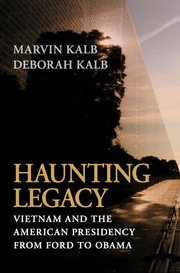Q&A with author David Maraniss
 Thursday, February 28, 2013 at 12:36PM
Thursday, February 28, 2013 at 12:36PM  David Maraniss is a Pulitzer Prize-winning journalist and associate editor of The Washington Post. His books include First in His Class: A Biography of Bill Clinton, They Marched Into Sunlight, and Barack Obama: The Story.
David Maraniss is a Pulitzer Prize-winning journalist and associate editor of The Washington Post. His books include First in His Class: A Biography of Bill Clinton, They Marched Into Sunlight, and Barack Obama: The Story.
Q: You've written biographies of both Barack Obama and Bill Clinton. What do you see as the main similarities and differences between the two?
A: The backgrounds of Bill Clinton and Barack Obama have several commonalities. They both came from provincial places far from the centers of power - Clinton from southwest Arkansas, Obama from Hawaii. Neither boy knew his father; Clinton's was killed in an auto accident before he was born; Obama never lived with his father, and saw him only once for a few weeks when he was ten.
In their childhoods, both Clinton and Obama had to deal with family dysfunction. Clinton's stepfather was an abusive alcoholic; Obama's mother, though loving, was often gone, leaving him with his grandparents, who were also devoted to him, but suffered from alcoholism themselves. Both Clinton and Obama invented themselves in the sense that they their strong male role models were few or none.
Yet they dealt with their situations in completely different ways. Clinton plowed forward, relentlessly, never trying to resolve the contradictions life threw his way but just getting up every day and forgiving himself and the world and moving forward. He became the ultimate survivor with incredible instincts about the people around him. Those traits helped get him to the White House, and into trouble in the White House, and then out of trouble, in an endless cycle.
Obama spent much of his young adulthood intensely, introspectively trying to resolve life's contradictions, and to find his own identity, racially, culturally, politically. He emerged from that process with a self-confidence and self-reliance that also helped get him to the White House and then at times got him in trouble in the White House. He didn't need people the way Clinton did.
Q: As you did your research for Barack Obama: The Story, were there particular things you uncovered that surprised you or changed your previous impression of the president's younger life?
A: As I studied Obama and his forebears, I could see certain patterns emerge that helped me understand him today. But I try to start fresh, with as few assumptions or prejudgments as possible, so that everything seems a surprise to some extent. I was struck by a few things.
First, that as much as he missed not having a father, and based his memoir Dreams From My Father around that hole in his life, he was in fact lucky that he never lived with his father, who was not just an alcoholic but physically and mentally abusive.
Second, that his mother was the conscience of his life, and always there in that sense, but that he carried a larger measure of anger toward her than I thought, and it came out later as a rejection of what he saw as her naive idealism. He carried that but also rebelled against it at various times.
Third, as my previous answer indicates, I was struck by the length and breadth of his effort from age 17 to 28 to figure himself out.
Q: Your book They Marched Into Sunlight dealt with the Vietnam War in October 1967--on the battlefield, on the campus of the University of Wisconsin, and at the White House. Why did you decide to structure the book the way you did, and why did you pick that particular time period on which to focus?
A: As I was researching and writing my first books, First In His Class, the biography of Bill Clinton, and When Pride Still Mattered, the life of Vince Lombardi, I noticed that I slowed down and became almost obsessed as their lives moved through the 1960s. That was the formative decade for me and millions of other postwar baby boomers, and I wanted to understand it.
I decided that the best way to do that was to write a book about Vietnam. I knew there was great literature about the war itself, and not such great literature about the antiwar movement, and that I hadn't seen a book that took those two very different worlds that were nonetheless about the same thing and tried to weave them into a single interconnected narrative. I started with the protest at Wisconsin because I was a freshman there that year, and it had stuck with me. I did not want to be a character in the book, but 1967 seemed perfect because everything was still up in the air, no one knew how the war would go, or what the antiwar movement would accomplish; life seemed to be changing week by week.
I went to the morgue at the Washington Post, where I work, and looked at newspapers from that 48-hour period and discovered the battle of my book, and just started reporting from there, finding connections that I never could have imagined. I consider They Marched into Sunlight my best and most creative book.
Q: In First in His Class, your Clinton biography, you describe Clinton's tortured relationship with the military draft. Do you think his lack of military service affected the decisions he made as president? Why or why not?
A: I think Clinton was deeply and unavoidably affected by Vietnam and his dealings with the draft. All the people of his generation were in one way or another, whether it be Clinton or John Kerry or John McCain or George W. Bush or Dick Cheney. Either they wanted to absorb the lessons of Vietnam or try to erase them, for better and worse.
Because he did not serve, and actively opposed the war, and because he was president at a time when Democrats were still losing the public relations or rhetorical ground on what defined loyalty and patriotism and strength, every action he took was either affected or interpreted in the context of his past, going back to Vietnam. It made it harder for him to develop a strong relationship with the military.
Obama, by contrast, came of age after Vietnam, and did not carry that baggage, and felt no pressures to either absorb or reject the lessons of Vietnam, but could approach military issues free from all of that, for better and worse.
Q: What are you working on now? Are you planning another Obama biography to pick up where you left off in the story of his life?
A: I have enough books on the horizon to keep me busy into the foreseeable future. I intend to do second volumes on both Clinton and Obama, but first I am doing a book on Detroit. Not its collapse, which will be the shadow of the book, but on what Detroit gave this country before its collapse. The book will take place in 1963 and focus on automobiles (the Big 3 sold more cars that year than any other year) music (Motown was starting to boom), labor (the UAW was at its peak) and race.
--Interview with Deborah Kalb. This interview also appears on deborahkalbbooks.blogspot.com.


Reader Comments